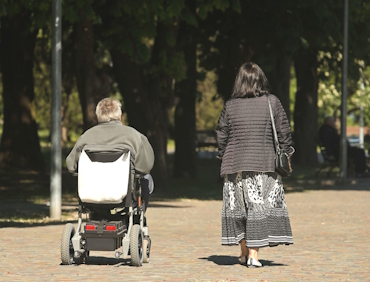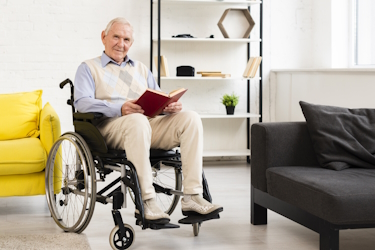6 Ways to Help an Aging Parent with Limited Mobility
Your parent’s age, weight, activity level, and/or medical conditions are some of the many factors that can cause your loved one to have mobility problems. Taking the necessary steps to care for your aging parent’s condition and movement impairments will benefit his or her physical and mental health – and overall quality of life. Following are six ways to help your parent who is experiencing mobility challenges.

1. Explore Aging Care Options
Aging parents with mobility problems may need an available caregiver who can attend to their needs, help them move around, and provide them with some company. Sometimes with a busy schedule, taking care of your aged family member can be challenging.
Enrolling your loved one in programs at independent living communities or moving him or her into a quality senior community can help your parent thrive, while receiving needed professional care. In these communities, there are trained professionals who can ensure your parent's well-being through medical assistance and help with daily tasks.
Mobility concerns can certainly be life-changing to your loved one, however, helping him or her maintain quality of life and stay engaged in activities can bring happiness even during this challenging time.
2. Promote Activity and Engagement
While most seniors may initially fear getting active because they are worried they might get hurt, slowly involving them in various physical exercises can boost their mental and emotional wellbeing.
Start by consulting your loved one’s physician or physical therapist about what exercises your loved one should do, while making sure the exercises are safe with a low chance of injury. Low-impact forms of exercise such as chair yoga, walking, stretching and swimming can keep your parent moving and feeing good.
3. Evaluate and Select Appropriate Mobility Aids
Seniors with mobility issues usually have different needs so a single device that you may have seen work for someone else might not be the suitable device for your loved one. Your parent may just need a simple cane, a walker, or crutches. Or, a standard wheelchair may be better for your loved one's needs. If mobility limitations are severe, an electric wheelchair may be more appropriate, And, a motorized scooter may be a good choice for those who are more ambulatory.
To select the right mobility aids, always consult with your parent's physician or physical therapist to get counsel on the best option for your loved one to use. Ask questions of your parent's providers about what aids will help to get around more easily and feel more independent.
Check into mobility accessories, as well. For example, if a wheelchair is the best choice for your loved one, consider accessories that will make the chair more comfortable and convenient. Adding a seat cushion to the wheelchair can reduce friction, absorb shock and lesson vibrations from the chair, which improve overall comfort. Wheelchair bags that hang on the side or back of the chair can be handy for storing books and other items. Cup holders and trays may also be helpful.
4. Provide Opportunities to Socialize
Adults with mobility concerns easily become isolated because of their condition. Providing your loved one with opportunities to socialize like attending church services, visiting a senior center, going out to restaurants, catching a movie, visiting a park, going for a drive, or inviting friends over can raise your parent’s spirits. Adequate socialization also helps reduce the risk of anxiety or depression.
Be sure to create a care and activity plan that your aged parent feels comfortable with – and stick to it because consistency brings about better results. If you have a busy schedule and find that you regularly miss following your parent's care plan, you may opt to hire a professional caregiver to assist your aged parent in the comfort and safety of your home. A licensed caretaker can help your parents with meal preps, bathing and grooming, exercise, medication reminders, and many other important tasks that improve the quality of life of your loved one.
If you and your parent decide that living in a senior community is the best option for happiness and care, carefully evaluate your options, Be sure to visit a number of communities and learn about their offerings, as well as pricing packages. Request references from current residents and research ratings to ensure the facility delivers a safe, quality living experience for your parent.

5. Make Home Improvements
Using mobility aids can be less complicated for your parent when you make significant changes in your home to accommodate his or her condition. Consider adding a ramp where you have steps leading to your house. If your home is two-story, try to make accommodations to enable your loved one to live comfortably on the main floor. Consider getting a motor-controlled lounge chair or bed to help your parent sit up or get up when he or she wants.
Clutter around your house can be extremely dangerous for your parents who have difficulty getting around. Go through your home at least once a day and ensure that there are no potential tripping hazards like power cords or items on the floor that can result in unwanted injuries.
Remember to keep your parent’s regularly used items on low tables, drawers, and cabinets where they can be easily reached without a struggle. This will help your loved one maintain a greater sense of independence and boost confidence.
6. Ask for Help From Family Members
While trained caregivers are an excellent option, sometimes your relatives can be better for your parent’s care. When you can’t be there for your loved one, a family member or relative can help you take care of your aging parent. The added value of a familiar face is immeasurable and can help your parent feel loved and treasured.
Endnote - Help an Aging Parent with Limited Mobility
Care Plan: Be sure to create a care and activity plan that your aged parent feels comfortable with – and stick to it because consistency produces better results. If you have a busy schedule and find that you regularly miss following your parent's care plan, you may opt to get him or her a professional caregiver to assist your aged parent in the comfort and safety of your home. A licensed caretaker can help your parent with meal prep, bathing and grooming, exercise, medication reminders, and many other important tasks that improve quality of life for your loved one.
Retirement Living Community: If you and your parent decide that living in a senior community is the best option for happiness and care, take time to carefully evaluate your options, Be sure to visit a number of communities and learn about their offerings, as well as pricing packages. Talk with currend residents, read reviews and research ratings to ensure the facility delivers a safe, quality living experience for your parent.
Related Info - Help an Aging Parent with Limited Mobility
Types of Manual Wheelchairs
A Primer on Electric Wheelchairs
Mobility Resources
Purchasing Tips for Scooters
- Mobility Advisor HOME ›
- Mobility Resources and Articles ›
- Tips for Helping an Aging Parent with Limited Mobility
Popular ArticlesTypes of Mobility Chairs Wheelchair Sports Activities Helpful Resource Organizations Mobility Scooter Buying Tips Portable Ramp Options |


